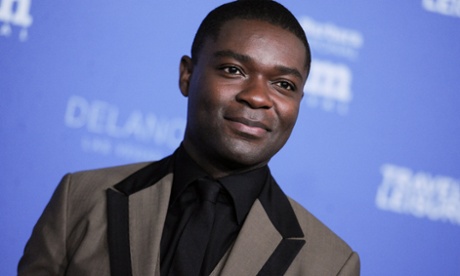The marriage and subsequent banishment of Seretse Khama, Botswana’s first president and former tribal chief, was big news in late-1940s and early-50s Britain, but had been somewhat forgotten until the film A United Kingdom – due to open the London film festival on Wednesday 5 October – put it back on the map. And according to its director, British film-maker Amma Asante, those who cared about the story, particularly in Botswana, were “comforted that it was going to be told through the gaze of a woman of colour”.
Asante was speaking at a press conference before the festival’s opening gala, and added: “The sense I got while we were filming was that [Botswanans] knew this was a great story, but [it] was an untold story, one that most of the world didn’t know about today … There was relief, and of course a curiosity, as to how their country, and they as a people, would be reflected on screen.”
Asante explained that she had decided to shoot the African scenes of her film in Botswana, rather than the neighbouring and more technologically advanced South Africa, because “we wanted the DNA of the country running through our film” – but they maintained a respectful approach to local traditions and authority by negotiating permission with village chiefs whenever a location was required.
A United Kingdom tells the story of Khama’s courtship of and marriage to British office clerk Ruth Williams in 1947, in the teeth of widespread social disapproval and international diplomatic scandal. Khama was the son of the king of the Bamangwato people, in what was then the British protectorate of Bechuanaland. In a particularly shabby episode of end-of-empire politicking, Khama was exiled from Bechuanaland in 1951, partly in an attempt to placate an apartheid-riven South Africa. After giving up royal status, the Khamas were allowed to return to the country in 1956, and Seretse Khama would go on to found the Bechuanaland Democratic Party, and become the first president of Botswana when independence was gained in 1966.
Actor David Oyelowo, who played Khama and was instrumental in getting the project off the ground, said he felt the film reflected the multicultural nature of modern Britain, as well as addressing the ongoing problem of diversity in the film industry. “What we are seeing in A United Kingdom is a reflection of the country we live in,” he said. “Amma directing this film shouldn’t be special, but here we are. We are still in that place.”
Both Oyelowo (who is also of royal lineage) and Asante are of African descent: the former’s family emigrated to the UK from Nigeria, the latter’s from Ghana. Oyelowo said he had first discovered the Susan Williams book Colour Bar, on which the film is based, when it was sent to him by the producers of another film he was working on. He added: “My hope is that people will see themselves in both Ruth and Seretse, they will see this country’s history, they will see the history of people of African descent, and why we are very proud to call ourselves British and to call ourselves African.”
Asante is the most high-profile black British female director currently working, having completed her two previous features A Way of Life and Belle (after a career as an actor, including a stint on school series Grange Hill in the 80s). She had sharp words for the marginal status of women film-makers. “As women, we are not a minority, we are 50% of the population. We also play a large part in getting men to the cinema to watch these films, that a lot of the time are about white men, in a certain age bracket. That’s not to say women directors should always direct women’s stories, but seeing the world through a female gaze from time to time shouldn’t be that odd. It’s getting better, but it’s still not good enough.”
She added: “We are not saying we want to stop films about white men being made, or get rid of them; just that there are other realities. I walk a female path every day, I see the world through female eyes, and I know there are 50% of people in this country who walk a similar path. It’s not about removing what’s already there, it’s about allowing a space for others to join, and have the same privilege.”
• A United Kingdom opens the London film festival on Wednesday 5 October, and goes on release on 25 November in the UK.











